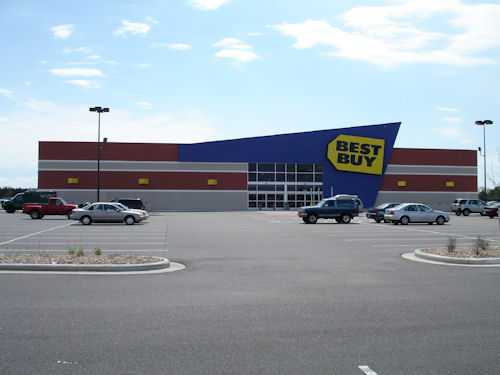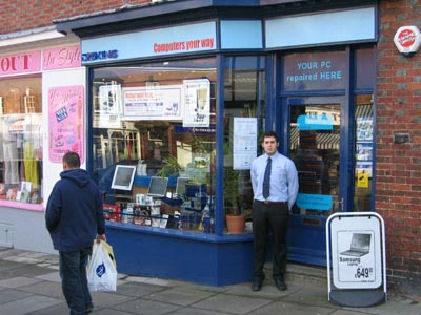Fighting back
The big shops like Best Buy are fighting back with their Geek Squad, which I have to say has proven to be quite effective for us. The prices are good, the service correct, and usually prompt including house calls.
But one thing you get from a small shop is a first name, and a relationship. You also get a familiarization of the shop with your setup, needs, and if they’re any good your personality.
The bifurcation of the sales channel has come about because of the sheer volume of shipments – the 100 million GPUs. Most of them went into new systems, and most of those new systems were Vista and most of the users were confused, frustrated, and in many cases completely stopped.

 The opposite ends of the spectrum
The opposite ends of the spectrum
I can’t tell you how many times, when finding out I’m in the computer industry, people will ask me: ‘do you know anyone who can help me with my computer?’ The implication being ‘will you help me?’ and the bottom line being: here’s a person that spent between $700 and $3,000 for a paper weight that lights up with a pretty landscape scene and doesn’t do much else.
This isn’t a dump on Vista diatribe; it’s an observation about an unexpected and certainly welcome new development in the computer industry, namely the return of the mom-and-pop shoppee, the small retailer – the channel. Now some may say I’ve been asleep and not paying attention that they never left. But I have been paying attention and I see the empty store fronts where shops used to be and I’ve noticed new ones popping up that don’t really look that much like stores, more like offices.
CeBIT is the international watering hole for these local retail shops as they try and connect with the big suppliers of computer gear.So where I really wanted to go with this rambling monolog was to point out that the giant CeBIT is the international, or at least the European watering hole for these little mom-and-pop local retail shops as they try and connect with the big and not so big suppliers of computer gear.
That’s CeBIT and CES and most other shows new role and if they get it right in time they’ll adjust their format to accommodate it. Ironic that Comdex was started for that reason, and now we’ve come full circle.
Now all you smarties out there – figure out how to connect the users with those small shops and you’ve found not just a pot of gold but a whole bunch of new friends.
HEXUS.afterburner
Scott Bicheno, HEXUS.channel editor, gives his view...
The resurgence of small, independent retailers and resellers in the US is potentially very encouraging for the UK. We are probably as influenced by US trends as any country in the world and there’s a good chance that changes in consumer behaviour over there will be mirrored over here.
We are already seeing signs that vendors are increasing their efforts to support the channel, a prime example being the interviews Stephen DiFranco and Richard Baker of AMD have given HEXUS.channel. I'm sure Intel, Microsoft and all the other members of the global technology community are thinking along similar lines.
As Peddie concludes, however, having a unique offering is one thing, bringing it to the attention of the market is another. Consumers still want good, personalised, local service, but a major challenge for the independent channel is communicating with those consumers.
This is one of the main reasons HEXUS.channel was created - to try to give the channel as many tools as possible to allow it to compete and, hopefully, to thrive.
If you are a local retailer and want to tell us more about your business or just offer feedback on this or anything else published on HEXUS.channel, please get in touch through the HEXUS community.













